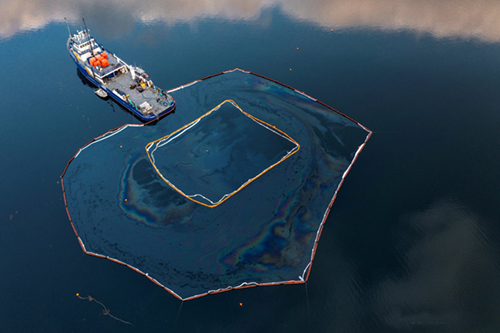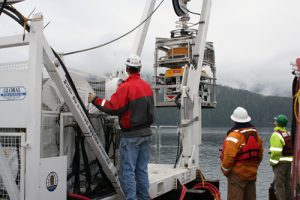
The maritime industry has changed and evolved over the past couple of years, due in large part to the coronavirus pandemic that has gripped much of the globe. But despite COVID-19 hampering the operations of many types of businesses, diving and salvage has not only continued, but remained steady.
And a number of West Coast-based companies have managed to stay busy with current projects, as well as with planning for the future. Here’s a look at the ongoing work of some of the major Pacific companies.
American Marine Corp.
American Marine Corporation, which has locations in Alaska, California and Hawaii and has been working in the marine construction industry since the 1970s, is currently involved in multiple projects that require replacement and/or upgrades to large subsea infrastructures on the West Coast, the company’s executive vice president, David Shahnazarian, told Pacific Maritime.
“These projects require substantial local knowledge of the assets and environment to ensure the upgrades are properly installed,” he remarked. “We anticipate a large volume of work coming up in the coastal marine construction business line which will require interface of our commercial diving business line and topside marine construction crew.”
Shahnazarian added that by providing both marine construction and commercial diving services in-house, American Marine is able to provide cost and production efficiencies as a one-stop shop for clients.
As far as technology developments or advances over the past couple of years, Shahnazarian remarked that American Marine has been working with some companies in the industry of underwater video and sonar imaging.
“We have been testing higher resolution sonar systems in our zero visibility subsea environments and we have successfully used these systems to improve our operations, efficiencies, and safety of our divers,” he revealed.
Shahnazarian remarked that COVID has been a struggle for many, including American Marine’s commercial diving business, but added that the company has managed to maintain the safety of its employees.
“I am happy to say that to date we have not had any COVID-related work stoppages for our team,” he said. “This is quite extraordinary with how many employees we have working and the substantial amount of hours diving. Fortunately, American Marine operates under a high safety standard which has helped contribute to protecting our employees during this pandemic.”
“We were one of the first companies to perform and pass the newer and stricter ADCI (Association of Diving Contractors International) audit, in addition we are IMCA (International Marine Contractors Association) certified and audited,”
he remarked. “This requires a substantial amount of effort to ensure our operating procedures and employees are performing at the highest level of safety. This effort is reflected in our low incident rates.”
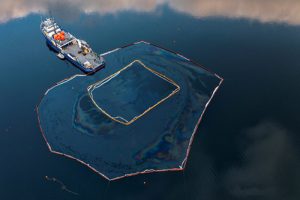
Global Diving & Salvage
Global Diving & Salvage, which has locations in the Pacific Northwest, Alaska and California, is currently under contract to the U.S. Coast Guard and working with two Alaska-based subcontractors, Paradigm Marine and Alaska Chadux Network.
In September, Global concluded response to the f/v St. Patrick oil spill in Womens Bay in Kodiak, Alaska. The St. Patrick, a fishing vessel, was towed to Womens Bay from near Marmot Island where in November of 1981, stormy seas rendered the vessel inoperable and claimed the lives of 10 of the 12-person crew.
In 1989, years after being anchored in Womens Bay, the vessel sunk to the seafloor where she lays to this day.
After years of deterioration underwater and an 8.2 magnitude earthquake off the coast of Kodiak, residents of Womens Bay noticed a significant oil sheen on the surface of the water. Global and its subcontractors mobilized to deploy a double-boom system, stopping the spread of oil.
Upon investigation by a Global dive crew, it was revealed that corroded rivets on the boat’s hull were causing pinhole leaks. With no drawings or structural information available, Global divers managed to inspect all internal spaces within the vessel and collected all recoverable hydrocarbons from accessible voids within the hull.
Upon completion in September, the team had removed 14,857 gallons of oily liquids and 11,176 pounds of soaked sorbent materials, Global officials say.
Regarding technology developments or advances over the past couple of years, Global has said that ADCI Executive Director Phil Newsum and Global Senior Vice President Dan Pierson have helped educate and coach members of the industry on the dangers of the differential water pressure, commonly found around drains, tunnels, pipes and valves, that can cause forces that are quick and strong enough to entrap divers.
“To mitigate the risk to our divers, Global has leveraged technology by conducting pre-dive inspections using remotely operated vehicles (ROVs),” company spokesman Eric Rose told Pacific Maritime. “Doing so, we can safely assess any job site and uncover all possible risks before our divers enter the water.”
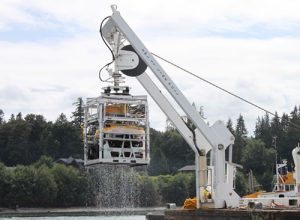
Global Diving, Rose said, maintains a fleet of light work class and inspection ROVs, which include high definition cameras that engineers and facility owners can view real-time.
Rose also remarked that for much of the diving and salvage industry, the type and frequency of work has been business as usual, due to the critical nature of it. However, he also said that the way crews are conducting their work has seen profound change throughout the pandemic.
Global Diving & Salvage Health, Safety, and Environmental Manager Spencer McGinnis mentioned that crews have had to adapt to complete their work with COVID precautions and risks in mind, while maintaining a high level of quality and safety.
“Leaders have had to rethink how to approach jobs from all angles and evolve with the unfolding pandemic,” Rose explained. “Crews must wear masks and other PPE (personal protective equipment) as well as clean equipment and workspaces more often to follow COVID safety guidelines.”
Indoor spaces have had to be evaluated and adapted, he added, also noting that job setup and staffing has had to be more dynamic than ever.
“Support staff have had to step up and take on this additional challenge while not allowing other risks to fall through the cracks,” he explained.
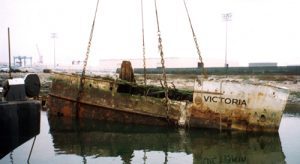
Pacific Maritime Group
Pacific Maritime Group, which has locations in San Diego and Long Beach, Calif., is comprised of Pacific Tugboat Service and Pacific Dredge and Construction.
Since the mid-1990s, PMG has performed over 25,000 tons of salvage consisting of vessels, barges, drydocks, and other unique structures a few of which included a F-18 jet, a Submarine simulator, and a 700-ton barge-mounted restaurant, according to CEO Grant Westmorland.
“Location, diversity of equipment and range of skills and experience allow PMG to serve a broad range of clients from commercial to government sectors,” Westmorland told Pacific Maritime Magazine. “This has allowed PMG to work consistently through economic uncertainty and an evolving industry.”
“Diversity has also developed PMG into a rapid-response salvage resource when the unexpected occurs such as oil-spills, marine casualties, national security incidents and severe weather incidents,” he added.
Recent examples of such operations include PMG and Global Diving coming together in mid-July after the large motor yacht Godfather struck a jetty and partially sunk off southern California. The vessel was lifted onto a PMG deck barge by a PMG floating crane for transportation to PMG’s Long Beach facility for offloading and scrapping.
“The readiness of the two companies prevented a potentially harmful environmental and navigation hazard and kept costs under control for the owner’s insurance company,” Westmorland said.
In September, PMG responded, along with Los Angeles area-based Ancon Marine to a diesel tank overflow on a beach. PMG used a landing craft to deliver heavy machinery and supplies to an inaccessible beach in Laguna Beach, Calif. so that response crews could mitigate damage and begin to remove contaminated sand.
In 2020, when the USS Bonhomme Richard burst into flames pier-side at Naval Station San Diego. PMG responded to the U.S. Navy’s emergency request for assistance as the fire quickly escalated. As other first-responders worked to control the blaze and save the ship, hundreds of thousands of gallons of water were being used, threatening to destabilize or capsize the ship.
PMG coordinated with the U.S. Navy Port Operations teams to provide a large tank barge, attending tug and a de-watering team to remove water quickly and safely as the fire burned. After the fire was doused, de-watering operations continued through completion and transfer to offsite treatment and disposal.
Once the immediate threat was over, PMG supplied months of heavy-lift floating crane service to remove superstructure and other components to allow access to below decks and prepare for removal and ocean tow for scrapping.
“We then supplied a rigging team to install all the tow and safety gear required for the long tow through the canal and to the scrapping shipyard in Texas,” Westmorland said.
PMG also responded in July 2020 when a U.S. Marine amphibious assault vehicle sunk off the coast of San Clemente Island, killing nine service members. PMG deployed a crane barge, outfitted with a four-point mooring and winch system and commercial dive team equipment, including a deep-diving ROV and a towing and tending tug, A.N. Tillett.
The team of salvors recovered all nine servicemen and the amphibious assault vehicle was also recovered for investigative purposes.
Regarding Pacific Maritime Group’s response to COVID, the company says it was immediate and is ongoing.
“Transportation and military support are both critical industries served by PMG,” Westmorland said. “A momentary pause in operations was about all the time that was allowed to prioritize the protection of crews and passengers, but it was effective.
“While some administrative personnel are able to work remotely with high efficiency, operations people needed to man vessels, dredge equipment, cranes and barges throughout the evolving COVID outbreak. The company instituted recommended hygienic procedures and utilized PPE, foggers, disinfection supplies, barriers, testing and vaccination as they became available.”
“The efforts have allowed PMG to service its many clients and projects in all locations with only minor disruptions, while many industries were crippled,” he added. “The pandemic certainly has thrown a monkey wrench in salvage and maritime operations in general, but the industry actually learned major lessons in documentation organization and communication due to travel restrictions.”
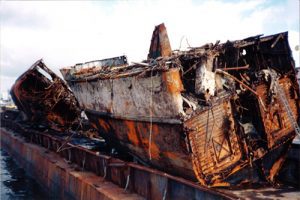
“When the travel restrictions hit, using email as a means of document control no longer was sufficient—or secure,” he explained. “While we had started getting set up and using cloud-based data well before, we accelerated getting set-up for fully integrated document workflow and data sharing. It also made us more efficient in meetings and scheduling using all the video meeting tools.”
However, he said, even with all the technological advances, some proven methodologies don’t change, pointing to the case of the recent salvage of the car carrier Golden Ray, which utilized a method of sawing the hull in sections with anchor chain and then placing sections on a barge for disposal.
“The maritime industry is comprised of many niche markets, from transportation of goods to deep-sea salvage, and so much more,” Westmorland said. “Some industry leaders have found success by focusing on a few, or even just one core competency and perfecting their skills and customizing their fleets to peak efficiency in that arena. With a fair number of large competitors jockeying for market share, there is not much room for smaller companies to join the fray.”
Pacific Maritime Group has navigated alongside industry giants by doing the opposite, Westmorland explained, and sees opportunity in the various gaps left between its larger colleagues.
That approach has allowed PMG to not just survive, but thrive, even in the midst of a global pandemic.

